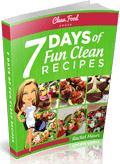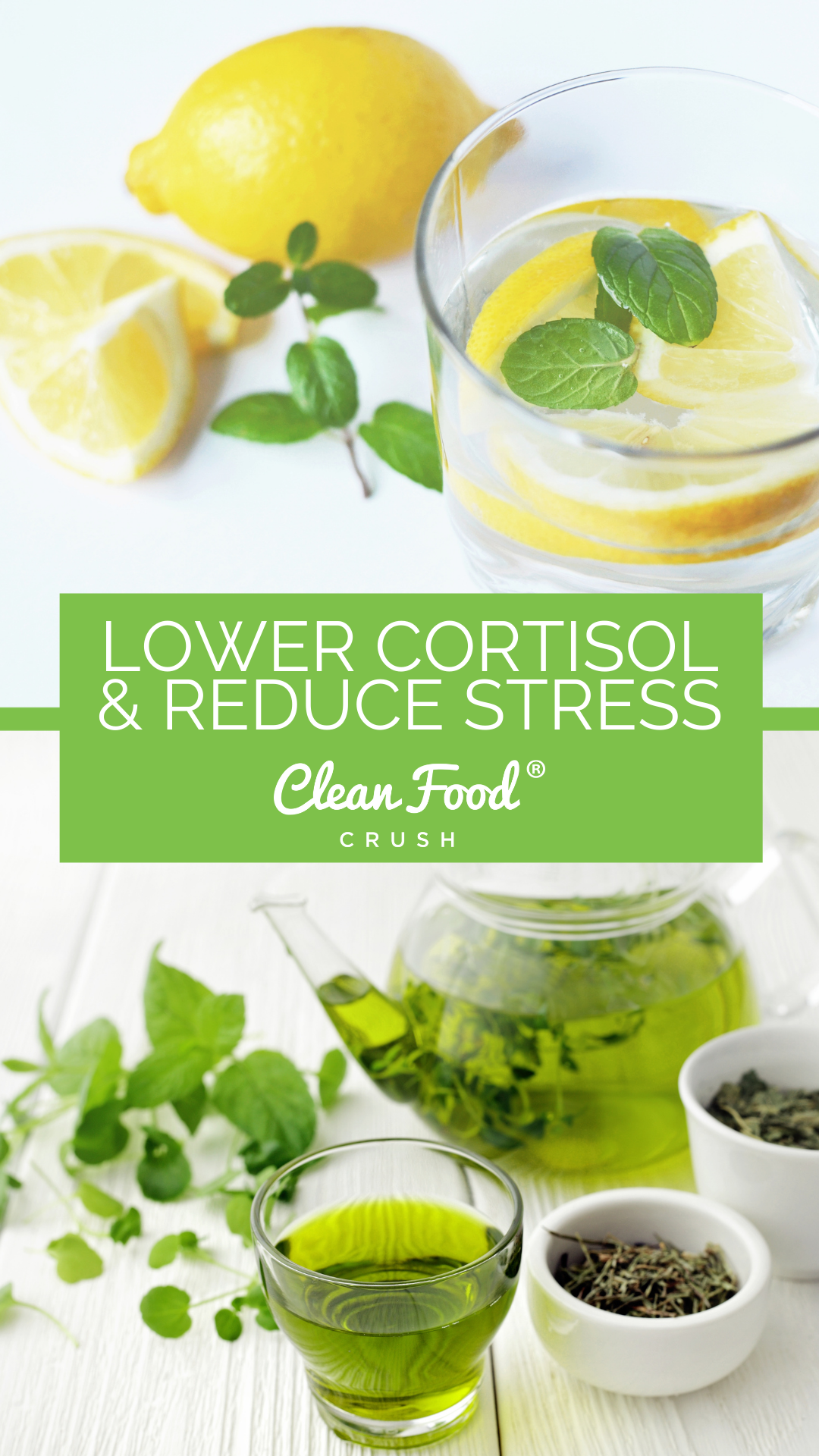

11 Ways to Naturally Lower Your Cortisol & Reduce Stress
Stress can cause immense impacts on the body. Our hormones play an integral role in our health and well-being. If they are out of balance, we may experience inflammation, weight gain, and other painful symptoms.
One crucial hormone is cortisol, which is a stress hormone that, when in balance, provides stable energy, ensures healthy digestion, and allows our body to burn fat properly. However, if our stress levels are too high, other hormones (like progesterone) may also convert to cortisol, causing trouble.
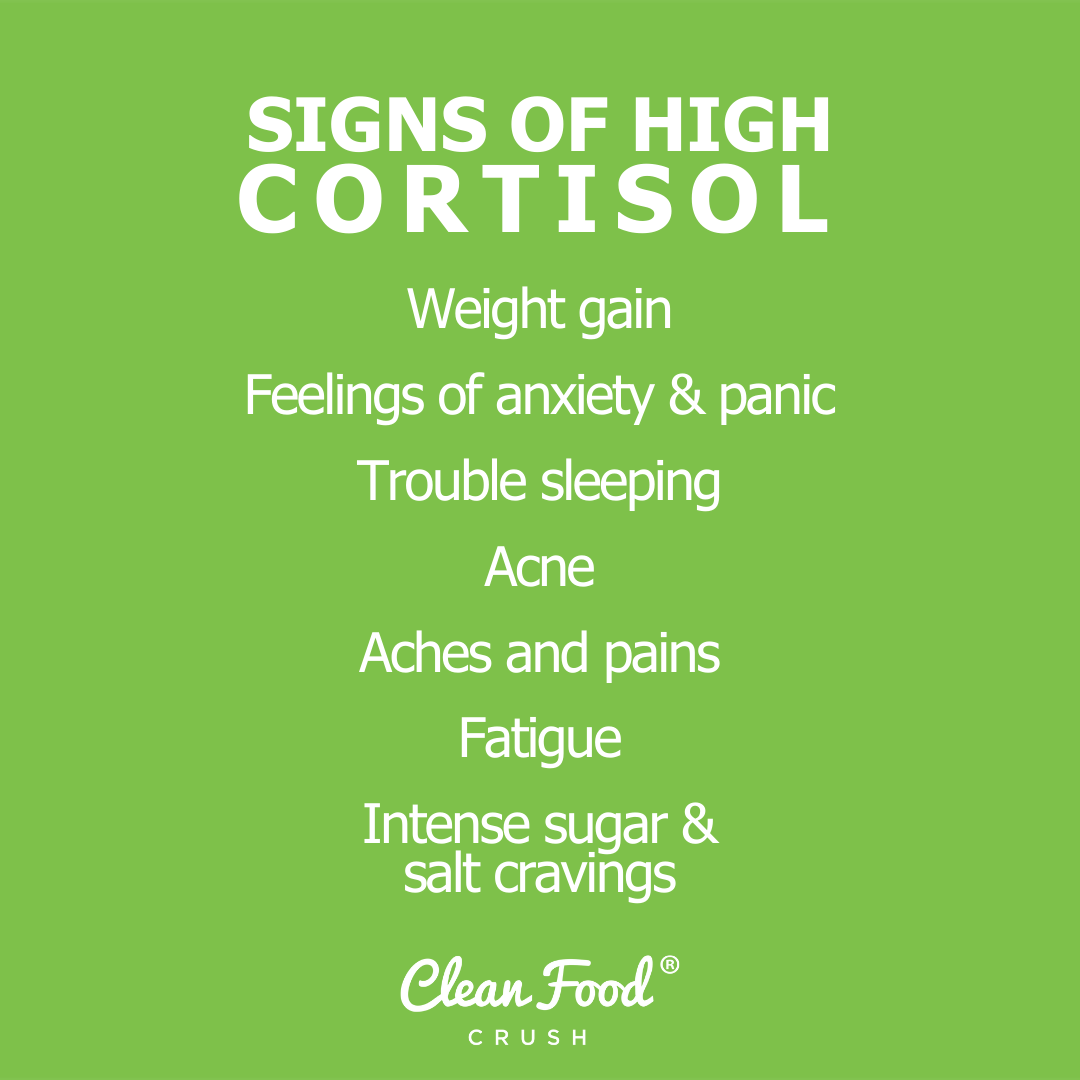
Some signs that your cortisol may be too high include:
- Weight gain
- Feelings of anxiety and panic
- Trouble sleeping
- Acne
- Aches and pains
- Fatigue
- Intense sugar and salt cravings
Here are 11 ways to help you naturally lower your cortisol, reduce your stress levels, and give your body what it needs to feel happy, relaxed, and at ease.
Supplementation
Be sure to check with your care provider if you’re on any medications before introducing herbal remedies to your lifestyle. Many of the following herbs can be taken in capsule form or made into tea. Herbal remedies are not overnight miracles, so expect to consistently maintain a regimen for at least a few months to achieve balance.
- Holy basil tea
- Lemon balm
- Ashwagandha
- L-Theanine or Green Tea
- Valerian root
- St. Johns Wart
- Omega 3’s: a healthy intake of omega 3 fatty acids can help ease anxiety, nourish your hormones and balance out your mood.
Probiotics
Did you know your gut bacteria could be making you anxious, tired, or sad? When feeling low or extra stressed, looking to gut health is critical. Taking a round of antibiotics after being sick is enough to throw off your whole gut, causing mood disturbances or weight gain. Eating sugar, fried foods, and other processed foods can also cause problems over time.
If you’re feeling stressed and struggling to relax, go to your local health food store or natural pharmacy and ask for a good probiotic supplement. This 50 billion strain from Renew Life is usually a great option.
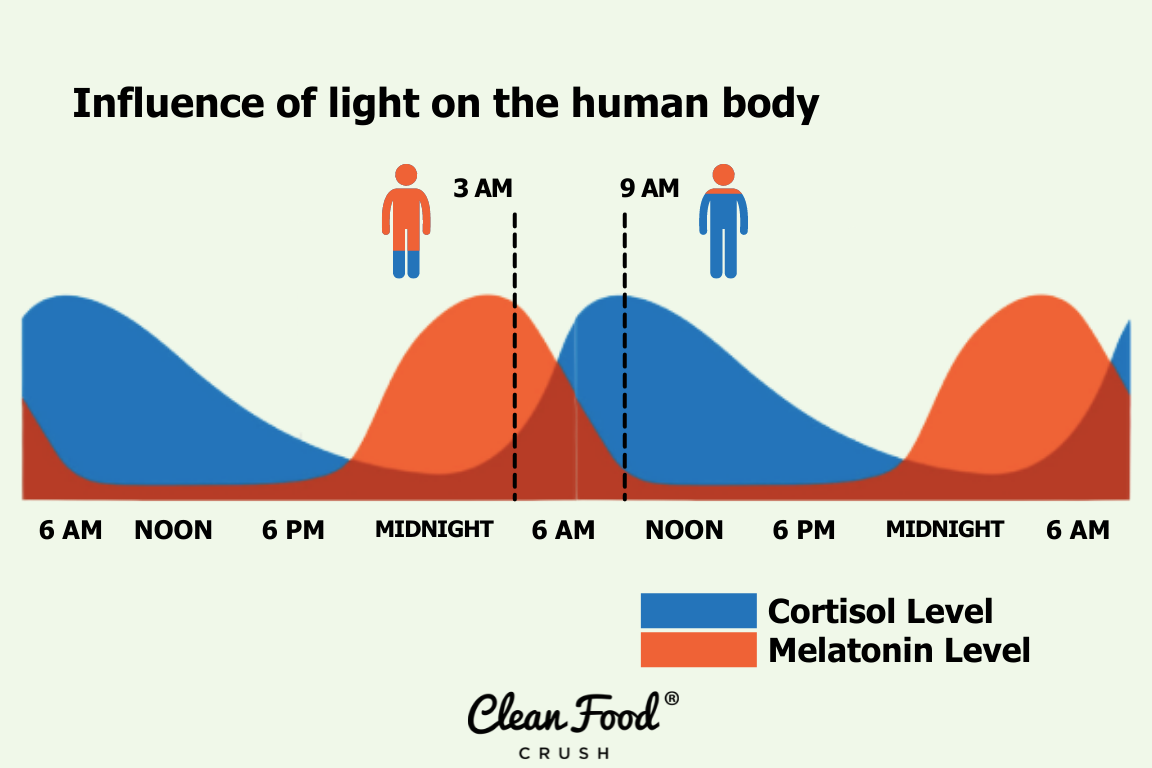
Dim the Lights
White and blue light can throw off your circadian rhythm and mess with your biological clock. It can prevent melatonin (the sleep hormone) at night from activating, which is essential for winding down for sleep.
A simple stress hack is to have a policy in your home around blue light. You can install salt lamps or red light bulbs in your home and only use red or low lighting after sunset (or after 8 pm). Battery-operated LED candles are another great option.
Screens are the primary culprit of blue light, and they can cause a lot of disruption. Try installing the free flux app on all of your devices. Flux will naturally shift the blue light on your device based on the time of day, making it easier for your brain to wind down when it’s time.
Reduce Caffeine Intake
Caffeine can increase cortisol levels in the body. In a healthy and balanced system, this doesn’t cause much concern. But, if you have high cortisol or feel especially stressed, this can be a challenge. When your adrenal glands are secreting more cortisol into an already stressed body, you might experience exhaustion, mood swings, anger outbursts, pain and inflammation, puffiness in the face, and more.
I know giving up caffeine complete is incredibly difficult, so I’m not going to suggest that. Instead, here are a few ways for you to balance out your caffeine intake to take care of your body:
- If you drink more than 3 cups of coffee a day, you might be overdoing it. Try having 1-2 cups a day max.
- Choose organic beans, as conventional coffee beans are a common source of toxins and mold.
- Make sure you drink at least 2 cups of water every morning before you have any caffeine.
- Take L-theanine with your caffeine which will help smooth out the cortisol response in your body.
- Consider alternative caffeine sources like matcha green tea, yerba mate, and black tea.
- Stop drinking caffeine after 2 pm to improve your sleep at night.
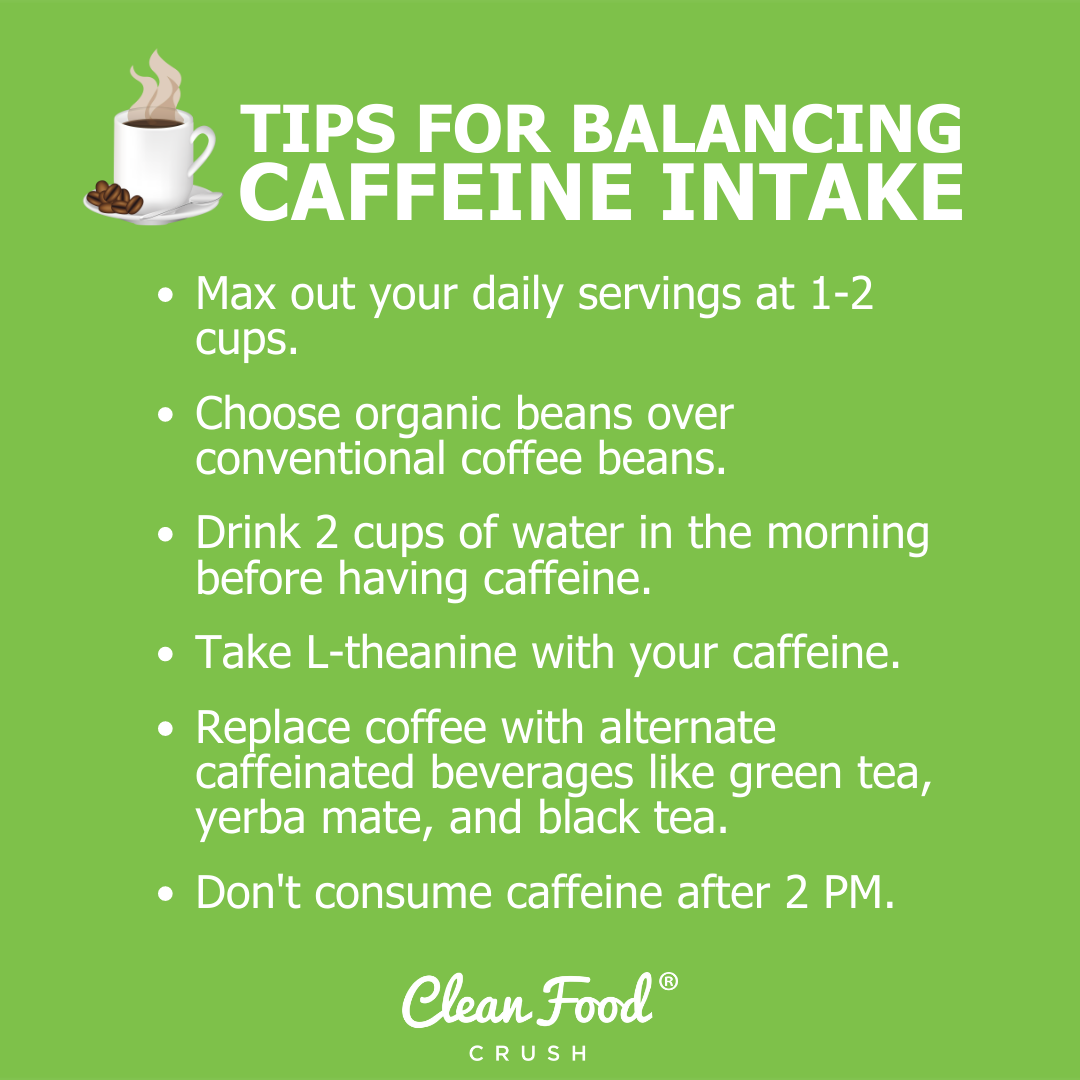
Try Yin-Yoga
Practicing a gentle form of yoga is excellent for your body, mind, and spirit. Yin-yoga is an effective way of naturally lowering cortisol levels and relieving stress. The practice involves gently moving into and holding poses for as long as 8 minutes each. It’s a slow, calming exercise that’s great to try before bed.
And there’s no need to find a studio to pay and practice in! You can find a free video on Youtube and practice in the comfort of your own home. Aim for 3 times a week to start building the habit.
Clarify Your Boundaries
Do you struggle to say no? Do you find yourself stretched too thin and overcommitted with little time for yourself? Boundaries are imperative as you begin to make changes to lower your cortisol and reduce stress in your life.
We literally cannot do it all. It’s ok to say no and prioritize the important things in life while creating a bit of extra time for self-care. We can only be there for others at the capacity we are there for ourselves. It’s not selfish to put time aside just for you!
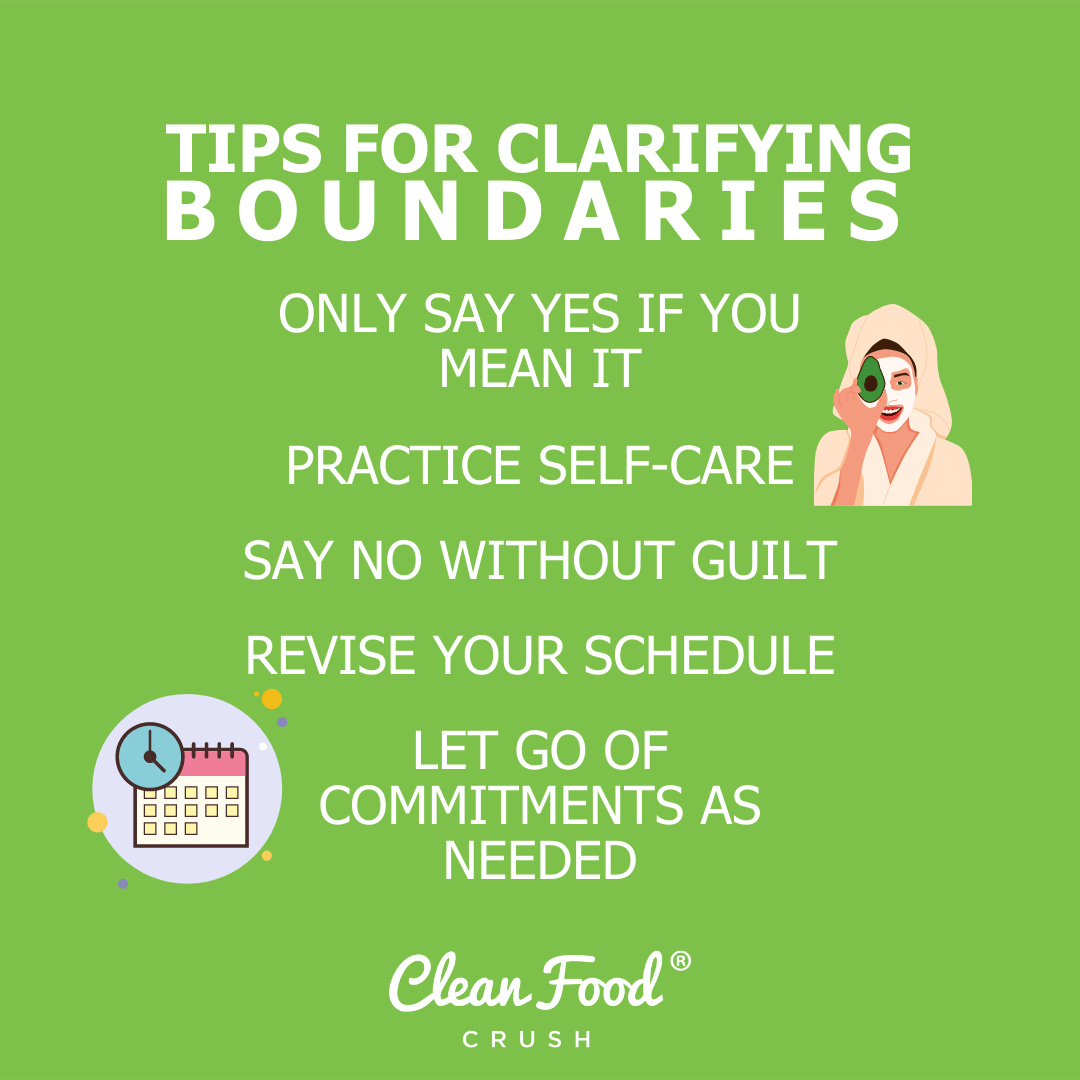
Here are a few tips for clarifying your boundaries:
- Take a moment to feel into whether you honestly want to do something or not before saying yes. Internal pressure makes you think you are obligated, and that isn’t a real yes. If you feel “no,” then say no!
- Schedule self-care time on your calendar. This could look like 1 day a week where you get at least 2 hours (ideally more) to take care of yourself. This could look like going for a walk in nature, reading a book, doing some yoga, taking a hot bath, getting a massage, or even just taking a nap!
- Don’t feel guilty if you need to say no more often. Your health is your number one priority.
- Do an overview of your commitments and see if there’s anything that you need to let go of to feel lighter and happier. If there are ways for you to create a lighter load for yourself while you’re working on your health, do so.
Ask for Help
This ties into boundaries in a big way. Trying to do it all yourself will almost certainly cause stress, exhaustion, and overwork. We’re not meant to do it all alone! By asking your family or friends for support when you need it, you’re being kind to yourself and setting a good example for others.

Here are things you can ask for help with:
- Meal prepping
- Grocery shopping
- Helping with the kids/taking them out for a few hours so you can rest
- Go out for coffee with a friend who’s willing to listen while you share any fears or stresses that have been weighing on you
Maybe you and a friend decide to take turns meal prepping for each other or watching each other’s children for one day a week so the other has time for self-care. It shouldn’t be your goal to do it all by yourself. Instead, find ways to receive support from your loved ones. This makes them feel useful, and it helps you heal!
Play More
Ok, seriously, we could all have a bit more fun! Play is such a key piece to feeling healthy and balanced. Laughter and silliness naturally raise our endorphins and happy chemicals, making for a stress-free body.
What are some things that light you up inside? Maybe you love spending time with your kids or grandkids. Perhaps you like going to a nature reserve, dancing, or trying new hobbies with groups! Whatever it is, get out there and enjoy yourself.
You deserve to experience play in your life daily. Find ways to incorporate play into your routine and invite your spouse, family members, or friends to join you!
Have an Epsom Salt Bath
Taking a hot bath with Epsom salts is great for absorbing magnesium through the skin, relaxing muscles, and preparing for a good night’s sleep.
Make the water temperature reasonably hot (not too scolding, though!) and stay in for at least 20 minutes to get the benefits of heat therapy. As you get out of the bath, excess heat falls off your body, lowering your core body temperature. A lower body temperature helps get deeper, more restful sleep. You can purchase Epsom salts at your local grocery store or health food store.
Create a Bedtime Routine
Consistency is perfect for lowering cortisol and stress. When your body is already in a state of unrest, any routines or consistent patterns you can create for your day-to-day will be helpful.
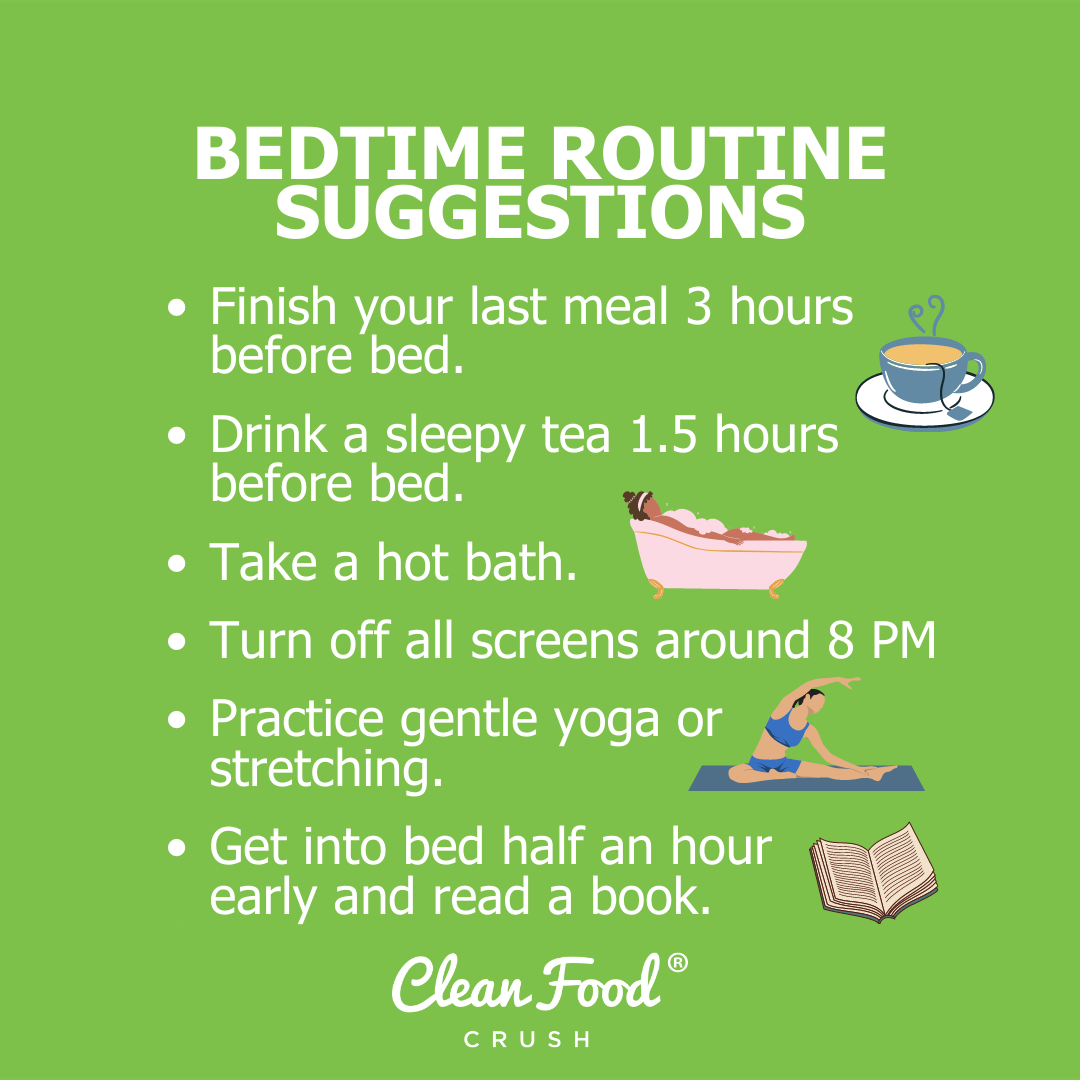
Here’s a bedtime routine suggestion that you can adapt to suit your lifestyle:
- Finish your last meal 3 hours before bedtime
- Drink a sleepy tea about 1.5 hours before bed
- Take a hot bath (optional and when you have time)
- Begin dimming the light and turn off all screens after 8 pm
- Practice a gentle yoga sequence or do some light stretching before bed
- Get into bed half an hour before you’re ready to sleep and read a book
Eat Clean
Last but not least, nutrition! What you put into your body cannot and should not be overlooked. The food we consume has one of the biggest (if not THE BIGGEST) impacts on our health. Consuming foods that cause inflammation and stress does not provide the body proper nutrients needed to heal and repair.
Changing what we eat can transform our physical bodies, emotional experience, and quality of life. Take Lorrie’s story, for example, who has diabetes and lost 15 pounds eating clean. Or Stephanie and her husband, who lost a combined 100 pounds and changed their lives with Clean Eating.
We can eat foods that give our bodies the building blocks they need to fight stress, keep cortisol levels in check, and provide us with an abundance of energy to enjoy life!
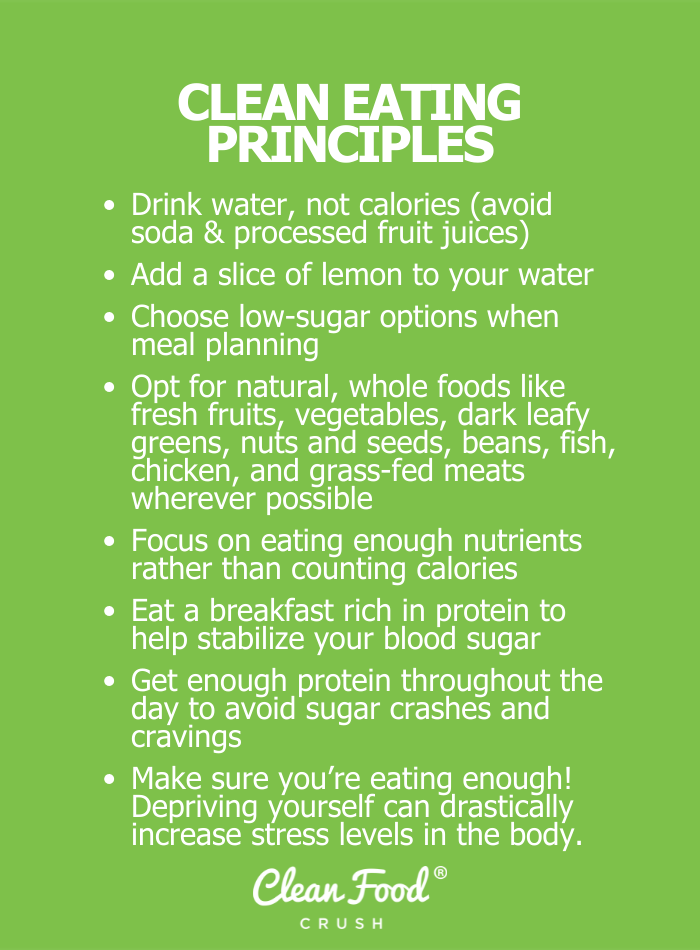
Here’s a checklist of Clean Eating principles you can follow:
- Drink water, not calories (avoid soda & processed fruit juices)
- Add a slice of lemon to your water
- Choose low-sugar options when meal planning
- Opt for natural, whole foods like fresh fruits, vegetables, dark leafy greens, nuts and seeds, beans, fish, chicken, and grass-fed meats wherever possible
- Focus on eating enough nutrients rather than counting calories
- Eat a breakfast rich in protein to help stabilize your blood sugar
- Get enough protein throughout the day to avoid sugar crashes and cravings
- Make sure you’re eating enough! Depriving yourself can drastically increase stress levels in the body. That’s why Clean Eating is the most sustainable way for achieving balanced health.
If you’re serious about improving your health and feel ready to make a shift, consider taking the 30 Day Clean Eating Challenge. The program is equipped with step-by-step meal plans, recipes, and a private group for accountability and daily support.
If you feel stressed, remember you are NOT alone, and it is NOT hopeless. Stress and anxiety are temporary feelings, and they can be treated. You can nourish yourself back into balance with natural supplements, lifestyle changes, and Clean Eating recipes.
Let us know in the comments which of these tips is the most helpful for you!












